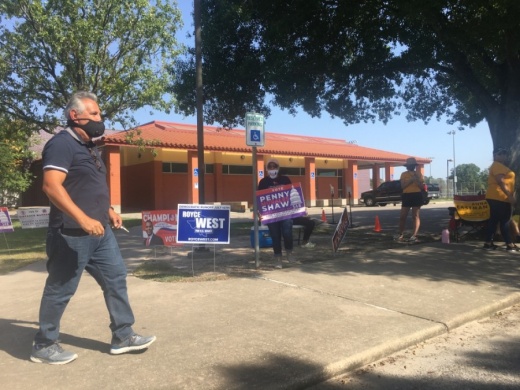The new funding—just over $17 million—will help support a $27 million effort that includes hiring 12,000 election workers, establishing drive-thru voting opportunities at 10 locations and sending mail ballot applications to every registered voter in the county.
"This is based on math," interim County Clerk Christopher Hollins said at an Aug. 25 meeting of the Harris County Commissioners Court. "We started from what we expect turnout to be, and we operated from there to understand what we need to do to accommodate those voters in a way that would ... allow voters to cast ballots in timely fashion and in a safe fashion."
In documents submitted to the court, Hollins outlined how the $27 million would be spent. The most expensive part of the plan involves the recruitment of poll workers, which will cost about $9.7 million. Other efforts include expanding the vote-by-mail infrastructure, buying protective equipment and promoting voting by mail, which will cost $5 million, $2.5 million and $2 million, respectively.
The plan also dedicates $800,000 to increasing outreach, $730,000 for training and $700,000 for curbside and drive-thru voting. About $23.6 million of the cost of operating the election will be reimbursable with federal funding from the Coronavirus Aid, Relief and Economic Security Act.
The clerk's office is also dramatically expanding the number of early voting polling locations, Hollins said. The county staffed 46 early voting locations in November 2016, and Hollins said he plans to increase that number to 120, which he said will help deal with the expected large turnout while still allowing in-person voters to space out.
The county also plans to operate a record 808 voting locations on Election Day, Hollins said.
Although the county is sending mail ballot applications to all registered voters, Hollins stressed only voters who are eligible to vote by mail should apply. To be eligible to vote by mail in Texas, a voter must meet one of four qualifications: be age 65 or older, have a disability, be a resident of Harris County but not able to vote in the county during the election or be in jail but otherwise eligible to vote.
Hollins also asked commissioners to consider opening additional clerk offices throughout the county, an effort he said would give people more locations where they could drop off mail ballots. Under Texas Election Code, mail ballots can only be dropped off at county clerk offices, Hollins said.
"We would need to have a real person there offering county clerk services. We would need to work out those details," Hollins told commissioners at the Aug. 25 meeting. "We would like county and court to offer additional locations, not only to serve the people of Harris County along a number of dimensions and provide critical services ... but also to accept mail ballots."
Hollins said he is expecting as many as 1.7 million voters to participate in the November election, as many as 1.5 million of whom could vote in person. Such a turnout would top turnout from 2016 by more than 350,000 votes. Harris County has roughly 2.4 million total registered voters, Hollins said.
The early voting period was expanded for the November election by Texas Gov. Greg Abbott and will run from Oct. 13-30. Hollins said he is also asking Abbott to extend the deadline for when the clerk's office can receive mail ballots. As of Aug. 25, he said he was still awaiting an answer from Abbott.
"We're encouraging [voters] to get ballots in the mail far before Election Day," he said.
The funding boost passed in a 3-2 vote with Precinct 3 Commissioner Steve Radack and Precinct 4 Commissioner Jack Cagle opposing the motion. Cagle pointed out the increase in cost from the 2016 election, which he said cost $4.1 million in total.
Radack questioned the precinct breakdown of where polling places were located, arguing Precinct 1 was weighted too heavily. Citing county clerk information, Radack said Precinct 1 was slated to receive 37 early voting locations, compared to 28 in Precinct 2 and 24 each in precincts 3 and 4. Precinct 1 was also slated to receive 236 Election Day locations, compared to 192 in Precinct 2, 181 in Precinct 3 and 187 in Precinct 4.
Hollins said the clerk's office is aiming to keep precincts even, but Precinct 1 was given more locations because of the number of people who work in the area. He said the numbers were changing daily and were not set in stone.
"This is an iterative process," Hollins said. "If there are locations in your precinct that could or should be Election Day or early vote locations, we would love to have that conversation and do our best to accommodate."
In voicing his support for the motion, Precinct 1 Commissioner Rodney Ellis said ensuring people can vote safely was worth the price.
"I think it’s a hefty price tag, but we are in challenging times, and I can't think of anything more important for us to invest in then in our democracy," he said.





